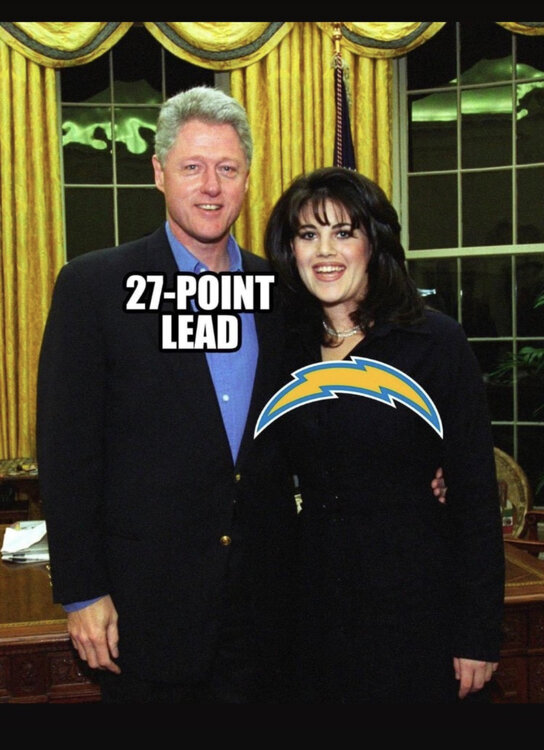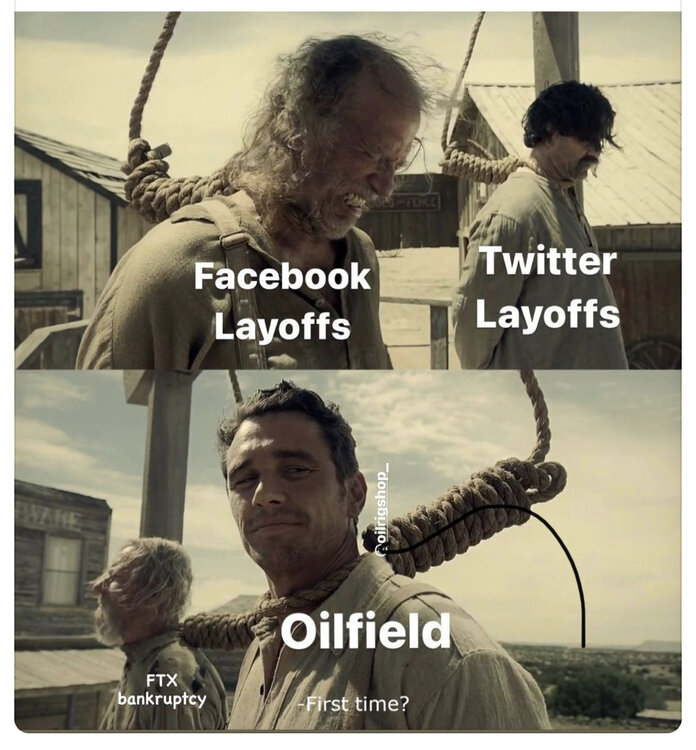-
Posts
532 -
Joined
-
Last visited
Content Type
Profiles
Forums
Store
Downloads
Recruiting - 2020
2019-2020 Football Season
Football
Entertainment
Sports
News and Business
Cloak Room
Transfer Portal
Recruiting
Events
Posts posted by Archer
-
-
1 hour ago, Patricio Swayze said:
I guess I am late to this, but just seeing Chesapeake sold off their Eagle Ford assets to INEOS for $1.4 billion. That doesn’t give me confidence that my current employer won’t do the same. I am used to project life and just wanted to stretch this until the end of the year. End of next year would be amazing, but I doubt it.
CHK is going back to 2006 and going all in on gas and getting out of liquids. If your company hasn’t stated the same I wouldn’t be as concerned.-
 1
1
-
-
4 hours ago, Snake Diggity said:
Congrats. I have hit the number that I targeted when I first started adulthood and made plans to retire early, but my priorities have shifted since having kids. Between that, lifestyle creep, and inflation, I will likely be working another ~10 years and only retire 10-15 years earlier than normal. The fear of being unable to re-enter the workforce after sitting out for years if things go poorly also has played into my plans more as I get older. The upside to that is that I should have far more wealth than I ever imagined I would and will have options to have/do some things I would have had to sacrifice had I retired now. But knowing that technically I could likely get by forever without working has lifted a great weight off my shoulders over the last couple of years, so I have no regrets over the sacrifices I made as a young person to accumulate the wealth I have so far.
This is pretty much me minus the kids.
Other than the early mornings the job isn’t too bad so I’ll try to get another 5-10 years out of it and really get a good safety cushion built up. I have started spending a little more freely with a good nest egg in place.-
 1
1
-
-
4 hours ago, StassneyHorn said:
What are you guys doing with annual bonus?
Annual cash bonus is coming in two weeks. Didn’t have any major spending plans at the moment. Is deposit into Vanguard money market smart ir am I missing something obvious? Didn’t want to necessarily start a CD ladder cause I wanted freedom to invest at drop of a hat with no penalty. Considered putting the whole thing into 401k but chose against in case of any old townhome repairs.
Part in the market, part on the mortgage, and part put back for commercial real estate.
I view the mortgage as my safe investment and everything else is in equities.
-
8 hours ago, JGrayDBU said:
Depending upon inflation, the numbers are solid, as in pensions from both my wife and myself equaling $47,000 per year - Non COLA and every time I calculate every expense known to this man I get a number just south of $40,000 if buying a small home with cash-----if renting a small apartment the expenses number is more like $45,000. Then the second wave of benefits comes in a few years later- with social security---hers $12000 per year and mine about $6000 per year. Mine is low because of the GPO. Those numbers do not count my job during retirement, which should yield at least 20k per year in deferred income.
Deferred accounts project to total $320k at age 60 for me before buying a house with cash and buying years of service. After those two big ticket items, deferred accounts should be in the 100-150k range. I have heard of Monte Carlo simulations and wonder if that is realistic thing to look into? I imagine planners charge a lot of dough to do Monte Carlo simulations?
There are free calculators and simulators all over the internet, do some research to see which are more valid and respected.
Here is one that gets referenced a lot:
-
 2
2
-
-
-
On 1/12/2023 at 11:41 PM, BehoId, The Underminer! said:
Back door Roth IRAs confuse me and the “growing tax free” looks to me like just playing with brackets in an algebra equation.
I make $1000 that I want to save.
Roth IRA is post tax money. So your value of your account is ((1-Tax rate) * (chunk of income devoted to saving) * return you get in market. If I’m at 37% bracket, apply to my $1000 and the market doubles my money over time, that gives me .63*1000*2 I can use in retirement.
Traditional IRA is untaxed money, but entire thing is taxed as income when withdrawn. So your value of your account is chunk of income devoted to saving * return you get in market. When withdrawn, multiply times 1-tax rate to see how much you get. If I’m at 37% bracket, apply that after my $1000 doubles over time, that gives me .63*1000*2. It’s the same equation.
The only difference I see is the timing of when to apply the tax rate — now or upon withdrawal (and therefore the rate may be different). If I’m a high earner now, why would I suspect my tax rate would be higher at retirement? Why would I want my $1000 taxed now instead of later? Aren’t I almost certain to be earning more taxable income now than in the future (and therefore taxed at a higher marginal rate now)? And if I’m talking about needing back door Roth IRA, I’m a high earner by definition.
It may be intuitive that you should “pay less in taxes” by doing it before it grows, but that doesn’t mean the amount you get at the end of the day is bigger.
it’s just:ROTH: ((1-tax rate) * (savings)) * (market growth)
OR
TRADITIONAL: (1-tax rate) * ((savings) * (market growth))
Those are the same thing, except I suspect tax rate is bigger under Roth because it is now.
So what’s the point of them? Thoughts:
1) I’m wrong
Not 100% this but this.
You are correct in the base assumption that withdrawals at full marginal rate should be equivalent What is different is the first $647,850 you withdrew for the year will be taxed at 10-35% and not 37%.
The income deductions for a pretax 401k removes income from your top marginal tax bracket, when you are withdrawing money you are starting to pay at the lowest marginal bracket
Big pension or SS checks can change the decisions on pre tax or Roth because it will give you a floor of which tax bracket you start in and the rates that your pretax will be taxed at. I haven’t done the math but I could see where someone with a really good pension (say 80% income replacement) would want to do Roth because they will be in or very close to the same tax brackets from the pension incomes.-
 3
3
-
 1
1
-
-
44 minutes ago, B00M said:
Assuming a long time horizon and stock market growth remotely sniffing historical averages, even if tax laws stay the same, wouldn’t you want to do predominantly Roth contributions to your 401(k) regardless of your current/future tax brackets? With access to a Roth 401(k), wouldn’t the only reason to use your individual Roth IRA be if the employee 401(k) investment options had excessive expense ratios? (Or if you maxed out your 401(k) contributions and some how qualified to make Roth IRA contributions)
So full disclosure I am not a financial pro, just a guy who likes personal finance and hopes to retire someday so everything I say could be full of shit…I would argue it all still comes down to tax brackets; I’ll show my work…
I’ll use 2022/2023 401K and taxesLet’s assume a MFJ couple earning $200k per year which puts them in the 32% marginal tax bracket.
They invest $22,500 in their 401k earning 8% yearly for 20 years they will have $104,872.
That $22,500 has 32% taken out of it before it can be invested as a Roth which leaves $15,300 to invest. Again growing 8% for 20 years the Roth is now $71,313.
In 20 years the tax man comes due. Let’s assume they withdraw the entire amount to live on that year. The Roth is easy its taxes free so they have the full $71,313. The pretax 401k isn’t so lucky, using 2022 taxes they will owe $19,004 in income taxes. Taking these taxes out the 401k is left at $85,868 approximately 20% higher than the Roth.
If this couple isn’t high earners but are just super savers and are in the 22% bracket the Roth ends up worth $81,800 so approaching the 401k.
The tiered tax brackets really help the 401k because you are only taxed 12% on the first $40k coming out of the account where your investments were assumed to go in at your full marginal rate.
-
 1
1
-
-
20 minutes ago, Zepol87 said:
I have been contributing over company match for 401k for a couple of years and have a Roth that I also contribute to as well. Should I just contribute their max match and put that other money elsewhere? Financially dumb so apologies for basic ass questions but I am about 4k a year over what my company matches
Once you are past the company match 401k contributions are a bet on your future tax rates and your ability to be a diligent saver.
If you expect to be in a lower tax bracket in retirement (most people are) put everything into your 401k now and pay lower taxes on it in the future. If you are not disciplined in moving money to investments investing extra in your 401k forces you to save. If you expect a big inheritance or other income that will increase your tax rate in the future or just expect tax rates to go up (they will in 2026) investing in a Roth or normal Brokerage account could be better than your 401k.
-
 1
1
-
-
20 minutes ago, Nice Guy Eddie said:
This is where it gets confusing to me and makes little sense. I contribute $6K in after tax funds, then in moving the $6K to the Roth, I have to pay the tax again? Makes no sense to me.
What if I create another IRA and Roth IRA with $0 in it? Then make these contributions.
Yup. The IRS considers the funds blended and does not recognize that you can move just the $6,000 after tax that you just contributed. You will owe taxes on whatever percentage of pretax all of your IRAs represent.
All of your IRA accounts are considered one big account by the IRS even if they are at different brokerages. If you have the ability to transfer from an IRA into your 401k that is one way to get rid of the old pretax funds so that you can transfer to a Roth without additional taxes.
-
On 1/6/2023 at 8:45 AM, Nice Guy Eddie said:
Can someone explain a backdoor Roth strategy to me? I'm in my 50s and fully fund my 401k and catchup contributions at work.
I also have an IRA and Roth IRA with Merrill. Rollover from a former job.
Can I just contribute after-tax dollars to the IRA and then immediately transfer them over to the Roth IRA? Are there income or other restrictions?
Since you are fully funding your 401k I assume you do, but do you exceed the Roth income limits where you have to use the backdoor Roth?One downside to the backdoor is the pro rata rule. Since you mentioned an existing IRA you will have to pay proportional taxes on the funds you move to your Roth. Let’s say you have $54,000 pretax in your IRA and invest another $6,000 after tax and move the $6,000 to a Roth. You’ll have to pay taxes on $5,400 on the conversion as pretax funds represent 90% of your total IRA balance.
-
On 12/17/2022 at 7:07 PM, Willfully Horn said:
I’m curious if property owners who suffer damage from these quakes are reimbursed by the wastewater injection industry.
There was a big 2016 earthquake in Pawnee, Ok one company settled earlier this year for damages and several others are still being sued.
-
 1
1
-
-
Why is Fogel mentioned so rarely in these discussions? It’s been Griner and Whelan in the headlines.
-
26 minutes ago, SquishMitten said:
I don’t know why this is so hard for both of us to get on the same page with the question and answer. I understand what you’re saying, but I still don’t think it answers the question. You say that by fracking you increase your output of water roughly equivalent to the increase in barrels. I would assume that’s the same regardless of method (i.e., the more barrels of oil produced, by any method, typically correlates to an increase in wastewater. Maybe if I ask it like this… to produce a barrel of oil from fracking, you will get 1-9 barrels of water. To produce a barrel of oil from non-fracking means, you will get between X and Y barrels of water. This is no longer a yes or no question/answer. Simply, what is X and Y?
All my previous caveats are the same: wastewater is unavoidable, not talking about recycling, fracking is necessary to continue meaningful production, etc. There’s nothing wrong with saying fracking produces more wastewater, leading to greater use of injection wells and increased seismology if the benefits outweigh the costs, which I believe they do.
Tough to discuss technical subjects with delayed text communications, plus you are delaying with a glorified caveman.
IF I understand correctly:
You are correct if you are producing the same reservoir fraced and unfraced you should expect to see the same water cut after the frac load is recovered. So both wells will give you X barrels of water per barrel of oil. This ratio should remain fairly constant between the wells.
The difference is the fraced well will be able to produce multiple times more oil and thus more water.
The frac doesn’t change what is in the reservoir just the volumes of it that can be delivered to the surface.
-
 1
1
-
-
24 minutes ago, SquishMitten said:
I understand that fracking is necessary. I'm not questioning that. I'm pro-O&G, for both personal and professional reasons. I'm only restating a yes or no question that was either being danced around intentionally or misinterpreted. I honestly don't know the answer, and I don't particularly care, but it's fair to admit that one process may have more negative effects. No reason to hide it or deny it, and that's BECAUSE of the points you made in your last two posts...the pros outweigh the cons (if it's even true that fracking produces more wastewater).
I’ve answered it a couple times directly and then expanded on it why it’s necessary, I wasn’t trying dance around any question
Again
The purpose of fracing is to produce more fluids. You can not produce just more oil or gas you get everything in one big commingled mess. By producing more oil you will produce more water. As I mentioned up thread you will produce anywhere from 1 barrel of water per barrel of oil to 9 barrels of water per barrel of oil. If a frac increases your oil production from 500 barrels per day to 1,000 barrels per day you will also double your water production.
-
 1
1
-
-
5 minutes ago, SquishMitten said:
All of the bolded part is irrelevant to the yes or no question I asked.
Fair enough, then let me rephrase...
The very nature of hydraulic fracturing is to increase the perm and connectivity of a reservoir so that it can flow more fluid. If a well didn’t produce more fluid after a frac companies wouldn’t be spending millions of dollars to do it. -
26 minutes ago, TwiceHorn said:
All true, but to squish's question, which relates to causality, it is true that frac'ing operations use more water than more conventional drilling methods and thus increase the need for water disposal or recycling.
Another question, though. I did some drilling and frac fluid patent work quite some time ago and even then, the emphasis was on inert and environmentally safe additives for frac'ing an other drilling fluids. Has that changed?
Or is it exposure of the frac water to hydrocarbon-bearing formations that contaminates it?
Yeah once it is pumped into the rock the most pure clean water is going to come out a brackish hydrocarbon cut mess.
The frac water is being pushed thousands of feet into the reservoir and is mixing with the in situ fluids. What flows back is a blend of oil, reservoir water, and frac water.
-
 1
1
-
-
50 minutes ago, SquishMitten said:
Getting a little heated here so I'll try to rephrase the question I think some are trying to pose.
First, set aside the argument about recycling since that is not universal and injection wells currently exist. Second, any method that creates wastewater, leading to the need for an injection well, does occasionally increase seismic activity.
Now, doing a side-by-side comparison between "traditional" drilling and fracking, does either method - more often than not - produce noticeably more wastewater than the other? If the answer is no, then your point is 100% valid that fracking does not have the downstream effect of increasing seismic activity (as compared to the other method). If either method typically produces more wastewater than the other, it is then fair to claim that such method leads to increased seismic activity (again, as compared to the other method).
That’s a bit of a strawman question and I’ll explain why I see it that way.
With hydraulic fracturing an operator may pump a million barrels of water into the well during the frac job so assuming all thing equal you will get a million extra barrels back (very basic and somewhat flawed assumption).
Why I am saying it’s not a completely valid question is that in the onshore US the old reservoirs that could flow naturally without stimulation or with very minimal stimulation are drilled up. The shale reservoirs that are being drilled and produced now do not have the ability to flow without stimulation. So there is no “traditional” drilling methods that can be used on these wells.
The US is currently producing 12 million barrels of oil a day, 9 million of that is coming from shale reservoirs.
https://www.reuters.com/business/energy/us-permian-oil-production-due-rise-dec-record-eia-2022-11-14/Without hydraulic fracturing we are looking at 3 million barrels of domestic production. Companies would probably put capital to other projects so maybe that gets to 4 or 5 million. Whatever it is we would be importing massive volumes of crude and everyone would be praying for $4/gal gas again.
-
 3
3
-
-
4 minutes ago, Porterhouse said:
Weird. But I recall Delaware makes more water than Midland and other basins? Or am I making that up? And are you working horizontal Wolfcamp and Bone Springs wells?
I have not worked Ops in Midland so I am not sure on their cuts or decline profile. I see water cuts from 40-90% but 60-80% is probably most common. We’re operating everything from deep Wolfcamp to shallow Avalon wells. Focus on BS and Wolfcamp like everyone
-
17 minutes ago, Porterhouse said:
The produced water is minuscule relative to flowback water. With these companies’ massive efforts (thanks for linking), you are at the very least delaying seismicity and allowing RRC and other regulatory bodies time to best determine where to permit disposal wells. And, Permian frac jobs aren’t slowing down for years.
That’s not what I see on the water production.
I work in the Delaware. 63% of our total water production is from wells drilled before 2022, 37% is from wells that we brought online in 2022. We have 30 two mile wells on active flowback today they represent 10% of our produced water totals.
For a small well count operator flowback water will dominate the volumes but once an operator has hundreds of producing wells across multiple drill years the flow back water becomes a much smaller piece.
-
1 hour ago, Updawg said:
Why don’t they do this or how often do they reuse it. Can they just keep using it over and over on frac jobs instead of pushing down some injection well?
All of the major operators have massive water recycling projects in all active drilling areas. Just Google “company sustainability report “. Here are a few:EOG: 90%+ recycled water use
Diamondback 29% recycled water use
https://www.diamondbackenergy.com/static-files/faf5ab25-5ab5-4404-8c04-c7bd387ae418
Chevron 99% recycled water use in Permian
https://www.chevron.com/-/media/shared-media/documents/chevron-sustainability-report-2021.pdf
Devon 53% recycled water use
https://dvnweb.azureedge.net/assets/documents/Sustainability/DVN_2022_SustainabilityReport.pdf
The problem is you get all of the frac water back in the first few months and then you have 20 years of additional water production and eventually you are done fracing to recycle into and are still producing water that has to go somewhere. -
23 minutes ago, kevwun said:
Yeah, that's why 4 of my neighbors are having well issues also. Never a problem during the last bad drought that was much worse than this one.
Which one of your neighbors sold their water and are now upset?
-
-
On 10/30/2022 at 7:02 AM, Buzzrock said:
You can get them at Academy (and probably elsewhere) with a cooler on the other side of the table.

https://www.academy.com/p/magellan-outdoors-shiner-tailgating-xl-director’s-chair-134613056
-
 1
1
-
-
1 hour ago, Dbeasy said:
This question needs to be answered. I continue to be haunted by the grossness of potentially not washing the outside of the glass. What’s the answer?
Didn’t know the thought of a dirty outside would be that concerning to people.
Glasses get a complete hot water and soap wash and then get put up. Glass washer can knock out any dust that may have settled between washes. It also cleans a glass when I’m switching booze. I’ll wash a Glencairn glass when I change bourbons during a night, will also use it to wash out the shot glass as I go between booze for me and the wife.
Have you guys not been to a brewery and seen them wash your glasses before filling?
-
 1
1
-







All Encompassing Investment and Financial Planning Thread for the Surly 99.5%
in 6th Street Journal
Posted
If you leave your job or get fired it must be paid back immediately or is considered a withdrawal with penalties and taxes, that is one downside.